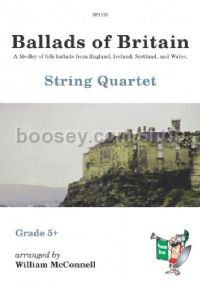Ballads of Britain for String Quartet
Ballads of Britain for String Quartet
* Estimated price converted from UK retail price
A selection of folk ballads from England, Ireland, Scotland, and Wales.
A ballad is the blending of words, the beauty of melody, tone, rhythm and expression. They reflect the history of a people, their legends, religion, love and work. British ballads are renouned for their verse, melodic construction and for the enormous range of expression.
1 – The Lass of Richmond Hill is a poem by Leonard McNally, a barrister, about a lass who became his wife in 1787. The music is by James Hook (1746 – 1827).
2 – Sally in our Alley. The words are by Henry Carey, who also wrote the original music, but this was replaced by the tune we now know, an English traditional melody, in 1790.
3 – Caller Herrin'. The poem is by Lady Nairne (1766 – 1845). Nathaniel Gow, the famous Scottish violinist, wrote the music in 1798 as a harpsichord piece, combining the traditional Edinburgh fish wives cry Caller Herrin', with the bells of St Andrew's Church, Edinburgh.
4 – Men of Harlech. The music is traditionally Welsh, and the ballad probably originated from North Wales where the native princes had ruled the longest.
5 – David of the White Rock (Dafydd y Garres Wen). Sir Walter Scott (1771-1832) wrote the words to this ballad The Dying Bard. David Owen, the Welsh bard of the ballad composed the tune on his death-bed, on awakening from a trance in which be believed himself to have heard the tune in heaven.
6 – Oft in the Stilly Night. The words describe an old man's memories of the smiles, the tears of boyhood years. The eyes that shone, now dimmed and gone, and how oft in the stilly night he remembers other days. The ballad is by the Irish poet Thomas Moore (1779 – 1852) who set the words to a traditional air.
7- The Meeting of the Waters. Written by Thomas Moore, music Irish traditional.
The Meeting of the Waters is the confluence of the rivers Avonmore and Avonberg in a beautiful valley near Avoca, County Wicklow.
8 – Oh! Charlie is my Darlin'. The words by Lady Nairne reflect the Jacobite Rebellion of 1745 led by Charles Edward Stewart (Bonnie Prince Charlie). The music is Scottish Traditional.
9 – The Vicar of Bray. Eighteenth century political ballad based on a real vicar who managed to keep his position through the reign of Henry VIII (Roman Catholic and Protestant), Edward VI (Protestant), Queen Mary (Catholic), and Elizabeth I (Protestant). The Bray in question is in Berkshire and the local proverb from there states that The Vicar of Bray will be vicar still. Similar vicars in later centuries were just as adaptable. The chorus of the ballad – And this is law, that I'll maintain, until my dying da,y sir, that whatsoever king may reign, I'll be the vicar of Bray, Sir.




